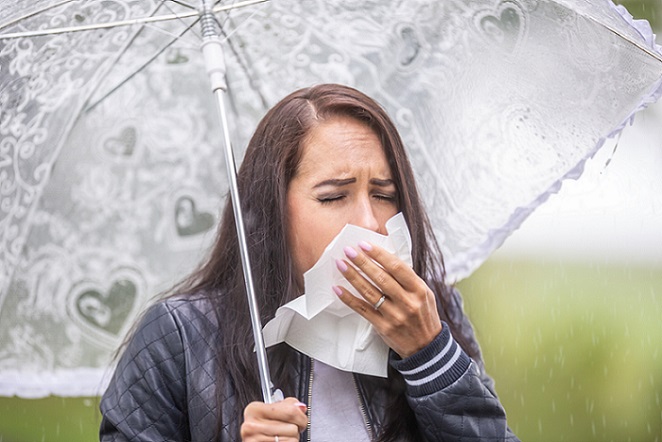
Monsoon brings a surge in cough, cold, and throat problems. The fluctuating temperatures during the monsoon can increase the chances of catching a cold or flu, accompanied by symptoms like runny nose, sore throat, watery eyes, fever, and chills.
Cold and cough are highly contagious, easily transmitted from person to person. With their vulnerable or developing immune systems, older people and children are particularly susceptible to these monsoon-related health risks. Practicing good hygiene is crucial during this season to prevent the spread of air-borne diseases.
Feeling under the weather during the monsoon? Monitor your fever with our range of thermometers. Explore here!
Here are some tips to keep cold, flu, and other air-borne diseases at bay during the monsoon.
1. Stay Dry and Warm: Avoid prolonged exposure to rainwater and keep yourself dry and warm to minimize the risk of catching a cold or flu. Getting wet in the rain for an extended period can lower your body temperature and weaken your immune system, making you more susceptible to illness. If you get wet, promptly dry off and change into dry clothes to avoid catching a cold.
Tired of lingering symptoms of cold and cough? Get relief from congestion effectively with our range of nebulizers and vaporizers. Visit here!
2. Take Cough Syrups: During the monsoon, cough syrup becomes a trusted companion in combating respiratory challenges. Its soothing properties relieve coughs, alleviate throat irritation, and assist in clearing stubborn phlegm. By providing comfort and promoting better sleep, cough syrup provides relief amidst the damp and allergen-prone season.
Find the perfect cough syrup for your monsoon needs.
3. Prioritize Good Hygiene: Maintaining good hygiene is a powerful preventive measure against contracting the cold or flu virus. Remember to wash your hands thoroughly before and after meals, after sneezing, coughing, restroom use, and other activities. Avoid touching your eyes, nose, or ears before washing your hands. Refrain from sharing food and drinks if you have an existing infection, cold, or cough. Ensure you carefully wash vegetables and fruits before cooking, regardless of the season. This step is essential as they may be exposed to dust, dirt, and harmful bacteria during transportation, leading to viral fever and infections.
4. Use Nasal Sprays: Find fast relief from nasal congestion caused by a cold. After clearing your nasal passages, apply the spray and avoid blowing your nose or sneezing immediately to maximize its effectiveness. Remember to follow your doctor’s or the spray manufacturer’s recommended usage duration for optimal results.
Say goodbye to stuffiness and breathe freely again. Try our nasal spray for instant relief!
5. Stay Hydrated: Make sure to drink plenty of water throughout the day to prevent dehydration. Staying well-hydrated can also help prevent dryness in your nose and throat, reducing the risk of catching a cold[1]. Hot liquids have shown promise in managing upper respiratory tract infections compared to cold liquids. Opting for hot beverages can provide soothing relief and aid in managing fluids while dealing with respiratory infections[2].
6. Opt for Immune-Boosting Food: Vitamin D, vitamin C, and zinc play essential roles in preventing and treating common colds, helping to shorten the duration and reduce the severity of symptoms[3]. Add foods like oranges and lemons rich in Vitamin C. Include mushrooms and egg yolks for dietary sources of vitamin D. For warding off cold, oats, cashews and chicken provide the dietary sources of zinc.
7. Choose the Ayurvedic Approach: A blend of tulsi leaves, ginger, and honey creates a potent mixture to provide soothing relief for sore throat and runny nose. Individually, each ingredient possesses anti-inflammatory and anti-bacterial properties. When mixed, this blend is rich in anti-bacterial, anti-inflammatory, and antioxidant properties, relieving seasonal infections, preventing diseases, and supporting digestive health.
Boost your immunity this monsoon with Ayurvedic solutions for cough, cold, and fever.
Discover here!
8. Sleep Well: A good night’s sleep is essential for a strong immune system. Getting enough sleep, at least six hours a day, is important to protect yourself from cold and cough during the monsoon. Lack of sleep weakens the body and makes it more susceptible to infections and viral fever[4]. Prioritize quality sleep to stay healthy and boost your immunity.
Sleep better, boost immunity. Discover our chest rubs and balms for a peaceful night’s sleep. Shop now!
Taking proactive steps to protect your health and prevent illness is key to staying strong this monsoon. By prioritizing rest, following medical advice, and adopting preventive measures, you can safeguard your well-being and minimize the impact of coughs and colds.
Happy monsoon!
(The article is written by Dr.Subita Alagh, Senior Executive, and reviewed by Monalisa Deka, Senior Health Content Editor)
References
1. Guppy MP, Mickan SM, Del Mar CB, Thorning S, Rack A. Advising patients to increase fluid intake for treating acute respiratory infections. Cochrane Database Syst Rev. 2011 Feb 16;2011(2): CD004419. Available from: https://www.ncbi.nlm.nih.gov/pmc/articles/PMC7197045/#:~:text=Potential%20benefits%20of%20fluids%20are,reducing%20the%20viscosity%20of%20mucus.
2. Saketkhoo K, Januszkiewicz A, Sackner MA. Effects of drinking hot water, cold water, and chicken soup on nasal mucus velocity and nasal airflow resistance. Chest. 1978 Oct;74(4):408-10. Available from: https://pubmed.ncbi.nlm.nih.gov/359266/
3. Rondanelli M, Miccono A, Lamburghini S, Avanzato I, Riva A, Allegrini P, Faliva MA, Peroni G, Nichetti M, Perna S. Self-Care for Common Colds: The Pivotal Role of Vitamin D, Vitamin C, Zinc, and Echinacea in Three Main Immune Interactive Clusters (Physical Barriers, Innate and Adaptive Immunity) Involved during an Episode of Common Colds-Practical Advice on Dosages and on the Time to Take These Nutrients/Botanicals in order to Prevent or Treat Common Colds. Evid Based Complement Alternat Med. 2018 Apr 29;2018:5813095. Available from: https://www.ncbi.nlm.nih.gov/pmc/articles/PMC5949172/
4. Cohen S, Doyle WJ, Alper CM, Janicki-Deverts D, Turner RB. Sleep habits and susceptibility to the common cold. Arch Intern Med. 2009 Jan 12;169(1):62-7. Available from: https://www.ncbi.nlm.nih.gov/pmc/articles/PMC2629403/